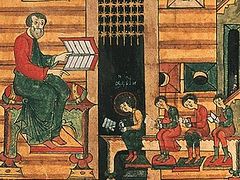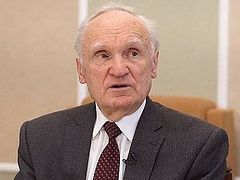Protsingel Arsenie (Muscalu) is one of the most respected Romanian spiritual fathers of our days, the spiritual son of Elder Macary from Paserya Monastery at whose feet he began his monastic path. After the elder’s repose in 2007, Fr. Arsenie was transferred to the capital, to the patriarchal cathedral, and in 2008 to the village of Cornu, to the newly re-opened monastery of St. John the Evangelist and St. Euphrosyne. In this interview we offer to our readers, an experienced father confessor talks about temptations, warnings to young people on the path to Christ, and about how Christians can lose God’s grace.
—How can we show young people what true life is, and how can we ourselves understand and show others that true life is life in Christ, and that the pleasures of this world are deceptive and transitory?
—The one in whom the fire of Christ’s love burns will spread the heat and warm everyone around him. And if we are cold as ice, if we have no warmth of God’s grace in our hearts, we can never warm anyone else! Thus, we must take care to acquire the grace of the Holy Spirit.
That religious life is what it is—limp and without a burning spirit—is something for which many blame the young; they are, we say, apathetic and have no burning zeal for spiritual life. How can this state that we all know—the increase of temptations, causes for temptations even in church life—how can this state serve to show God’s judgment? Here is how, especially among the young.
We receive baptism in childhood and do not do it consciously—we receive it based on the faith of our godparents and parents who bring us to the church. And there grace enters to abide in the heart of the newly baptized. He is strengthened by the gift of the Holy Spirit in the Sacrament of Chrismation, unites with Christ in Holy Communion. And it is the astounding and terrifyingly great duty of the parents and godparents to collaborate with the grace planted in the child’s heart and to make it so that the child as he grows might freely and consciously assimilate what he discovers in himself according to the measure of his maturity. However, you know how young people are growing today. In how many homes that call themselves Christian today can we find a spiritual atmosphere? Very few… And how many parents consciously collaborate with the grace in their child’s heart in order to help him, so that when he reaches his teenage years he might consciously assimilate what is already within him? Very few…
Therefore children reach their teenage years without having any kind of self-awareness, no consciousness of Christian life, that new life, which was planted in them. That is how it often is. And then God acts as if from the outside to aid in awakening grace. The grace received at Baptism is in the person’s heart, in the child’s heart, in the heart of the youth, but in the form of a smoldering coal under the ashes, still glowing under these ashes. And so grace blows upon it from the outside, in order to disperse those ashes and ignite grace in the heart, within the heart.
Thus, this is God’s judgment, because parents have what they raised. That is, today’s youth, let’s say, are the fruit of their parent’s apostasy. But it is true that although they have this defect, that the majority of them from the tenderest age did not grow up having a living connection with grace, God nevertheless does not deprive them. For unto whomsoever much is given, of him shall be much required: and to whom men have committed much, of him they will ask the more (Lk. 12:48). God loves them, and God takes care of them. But they will have to struggle all the time—perhaps all their lives—with their own inadequacies proceeding from how they were brought up.
—Father, today there are people who insist that they are believers but say that they have their own faith, that they don’t need to go to church, that they can pray at home. What can we say to them?
—We can say that if their faith can save them then let them be content with their faith. We believe that it is God’s faith that saves us, and not our own. Thus does each of them create his own church, his own faith, and if they are content with that, if they feel that it lives there, that they are saved their, then very well. But we strive to live in God’s faith.
Our religion is God-revealed; it is not of human origin. People can have their own faith, that’s true, but this says nothing. It speaks of nothing. This “own faith” of theirs cannot save them. The holy apostle James, you well know, says, show me thy faith without thy works (James 2:18). Some say, “I have faith in my soul, I don’t need to go to church or confession.” Do you have faith in your soul? Show me thy faith without thy works, and I will show thee my faith by my works.
Thus, our faith should be as it was revealed to us by God, and not what we ourselves have formulated. We should not have “our own” faith; we should have the faith of the Church, the faith of God. The faith of the Church is the faith of God.
—Can we conduct a spiritual life without a spiritual instructor, without a father-confessor? How can we find one if we don’t have one?
—We cannot conduct a life in the Church without a spiritual instructor. You have seen that the first Christians continued steadfastly, as the Scripture says, in the apostles' doctrine (Acts 2:42). This is the foremost work. How can we find him? I think that there is no one who really wants to find one who can’t. God’s love for man is so great that a person doesn’t even finish taking a step before the Lord takes a thousand steps to meet him. This is a promise; the Lord said, Seek, and ye shall find (Matt. 7:7). This is said with a promise: seek, and ye shall find. This is God’s promise. Thus, whoever wants to find one must sincerely seek and pray, and of course, he will find one.
—Can you tell us what are the main temptations of a young person who desires to come to Christ?
—I don’t know whether the temptations I will cite are the main ones. St. Theophan the Recluse says that a quality of youth is the desire to make an impression, and the thirst for knowledge (collect information), and the thirst for socialization, communication. On these aspirations, which have a natural basis, many temptations can grow like parasites to tempt young people. The desire of a young person who is coming to Christ to make an impression and gather knowledge be transformed into natural zeal, I would call it. The holy apostle Paul in his Epistles to the Hebrews and to the Romans speaks of the Jews thus: My heart's desire and prayer to God for Israel is, that they might be saved. For I bear them record that they have a zeal of God, but not according to knowledge. For they being ignorant of God's righteousness, and going about to establish their own righteousness, have not submitted themselves unto the righteousness of God (Rom 10:1; see also Heb. 6:11).
Young people can confuse natural youthful enthusiasm with spiritual zeal, and being guided by this enthusiasm, they can be thrown into many deceptions and errors. Fr. Roman (Braga) recalled that when he was young—it think it was right after the Second World War, during that troubled, turbulent period—they felt that university life needed some kind of renewal in a Christian spirit, and wanted to organize something to that effect. Having drawn up a plan for some sort of association they went to Fr. Sandu (Tudor) in Antim Monastery. But Fr. Sandu was very tough on them, very stern, and said, “Do you have anything besides enthusiasm? You have zeal, you have enthusiasm, but do you have anything else?”
Enthusiasm is natural to youth, but it is not enough. If young people do not also have obedience, obedience with discernment, and they are governed only by that enthusiasm, they can be drawn into many errors.
I would say that in these times, serious temptations proceed from this lack of spiritual upbringing. Young people from their earliest years, from childhood, did not grow up in an atmosphere of the spirit; there was no atmosphere in their families that was penetrated with spiritual fragrance. Therefore they are easily disoriented. And the manifestation of natural zeal, that is enthusiasm (there is another inclination natural to youth—the inclination for dreaminess and absolutization of specific things), and the temptation proceeding from this is the following, which I prefer to illustrate with the words of the Psalmist. He says, Some glory in chariots, others in horses (cf. Ps. 19:8), and I would add, “and a third glory in their spiritual fathers”.
And thus do churches and churchlets start to form, and the same thing happens that happened among the Corinthians, whom the apostle Paul reproached for having divisions amongst themselves, saying, “I am of Apollos,” “I am of Cephas,” “I am of Paul,” “but I am of Christ.” The apostle rebukes them and says, Is Christ divided? was Paul crucified for you? or were ye baptized in the name of Paul? (1 Cor. 1:13). And he testifies to them that this is fleshly wisdom, human wisdom; that is, he shows them that nature is getting the upper hand over them and is playing a dirty joke on them. Here is what he says: Therefore let no man glory in men. For all things are your’s; Whether Paul, or Apollos, or Cephas, or the world, or life, or death, or things present, or things to come; all are your’s; And ye are Christ’s; and Christ is God’s (1 Cor. 3:21–23).
Yet another temptation of young people who are coming to Christ today is a worldly spirit, an all-destroying spirit, which has penetrated everywhere, with which they will have to struggle very, very much. But for this I tell everyone to run to confession, and if you pray before confession that God would give your confessor words unto salvation, the father-confessor will tell you what to do.
—Father, how can we avoid false zeal and piety, hypocrisy?
—One must always test oneself by one’s fruits. There are fruits of zeal, which St. Isaac the Syrian calls mad zeal, undiscerning zeal, which thinks that it is being fervent for God’s sake but does not have godly fruits—it has no purity, no temperance—no godly fruits. Thus, we have to test the nature of our zeal by its fruits. If our zeal does not have the fruits of the Spirit, that means it is not a zeal of the Spirit.
—Can our zeal be born of pride?
—It most often is born of pride, this zeal, and it can be seen that it comes from pride, especially when it ends up in contempt for others; judgment and contempt for others. Then it undoubtedly is born of pride and this is the worst thing of all. When it is born of simple ignorance it is not so ruinous, but when it is born of pride it can take a person very far into his error—because when it is born of pride, the person usually can no longer accept any words of correction from anyone. I would even say that God Himself in His goodness cannot correct such a person, because he no longer accepts advise from anyone, considers himself sufficient unto himself—for he has testimony of the righteousness of his life: that zeal he is experiencing.
—Father, how can we attract the action of the Holy Spirit in order to acquire a contrite heart? What are the signs of this contrition of heart?
—For it is God which worketh in you both to will and to do of his good pleasure (Philip. 2:13). Acquiring contrition of heart, I would say, depends not so much on us as on God. He seeks us first; God seeks us first. A person who feels in his soul a yearning to seek has something in his soul that is calling him to seek. I would say that he has already felt a small contrition of heart. Our problem is not the problem of a contrite heart, how we can acquire it; this depends more upon God. I think that almost all of you present here have at least once in your lives felt this contrition of heart. Because otherwise I think you would not be here. Our problem is how to continually abide in what follows after this contrition of heart. You can see (I think that it is like this for everyone): When you fervently came to the Church for the first time, it all went easily for all of you—prayer was joyful and light, and I don’t think that you were bored in church. It all gave you joy, you abode in an atmosphere of joy—light and inner joy. That is how it is when God’s grace calls you.
But we do not remain unshaken in this grace, and that is our problem. Therefore each of us should ask himself, “What have I done? Where did I squander that first grace? How did I encumber it?” Because as long as we do not understand through what gates we left the state of grace in which we were at the beginning in order to return again to it in repentance—along the same road, nevertheless—we will never be able to reach that initial state again.
Thus, our problem is not how to acquire contrition of heart—this is God’s problem. It is God Who is seeking and calling us. Our problem is how to preserve what we receive from God. If we once received something and now no longer feel it, then this is a sign that we need repentance—sincere, pure, and real repentance.





